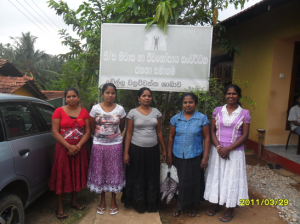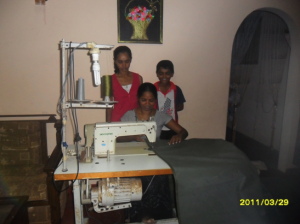スリランカ南部にある歴史のある町、ゴールは、2004年12月に発生したスマトラ沖地震の津波で、島の3分の2の沿岸を襲われ、大きな被害を受けた。田舎から移住した人や農業や漁業に携わる人たちが混在する活気あふれる町には20万人の人が住んでいた。しかしあの日、津波は町の中心部周辺地域を破壊してしまった。
夫と2人の子どもと住んでいた、チャンドララサさん(38歳)は、津波の響くような音を聞き、5km離れた丘の上まで家族とともに逃げて無事だった。しかし、チャンドララサさんの家や財産は、ほんの数分にしてすべて失われてしまった。
 津波から8年が経ち、チャンドララサさんは、将来を見据え、津波前とは生活を一変させていた。2年前に、ダダラウォッテ協同組合という地域に住む低所得者に貸付を行うコミュニティ銀行のリーダーに選ばれた。この貸付制度は、チャンドララサさんと友人らの発案だった。
津波から8年が経ち、チャンドララサさんは、将来を見据え、津波前とは生活を一変させていた。2年前に、ダダラウォッテ協同組合という地域に住む低所得者に貸付を行うコミュニティ銀行のリーダーに選ばれた。この貸付制度は、チャンドララサさんと友人らの発案だった。
「津波のときに受けた支援の際に得たお金の半分は蓄えておこうと思いました。支援というものは永遠に続くものではないからです。蓄えておかなければ、将来的に経済的困難に直面するのは、わかっていましたから」とチャンドララサさんはいう。
小さくスタートした貸付プロジェクトは、まず被災者支援金として得たお金の半額分を20人の女性から集めた。総額約2000ドル。地元の銀行に預けるという形だったため、女性たちが受け取った利息は12%だった。
その後、女性たちは地域に対してファンドをスタートさせることにした。起業した経験もなく、トレーニングすら受けたこともないため、どうやって始めたらいいか話し合い、とりあえず、地元でゴールの支援をしているNGOの門をたたいてみよう、ということになった。
 女性たちは6か月間、HELP-OというNGOから経理とマネージメントのトレーニングを受けた。その後すぐに、月1ドル以下という少額ながらも、きちんと毎月の会費を払える人を集めて、小さな協同組合を立ち上げた。資金が少しずつ集まり、地元の人々に貸し付けができるようになっていった。
女性たちは6か月間、HELP-OというNGOから経理とマネージメントのトレーニングを受けた。その後すぐに、月1ドル以下という少額ながらも、きちんと毎月の会費を払える人を集めて、小さな協同組合を立ち上げた。資金が少しずつ集まり、地元の人々に貸し付けができるようになっていった。
この制度でお金を借りるのは、主に女性で、家を建て替えたり起業したりするお金として借りている。協働組合のリーダーたちもまた女性で、任期2年で選出される。チャンドララサさんは何度も再選されている。この仕組みは大成功し、チャンドララサさんは、アジアの他の国にある類似した起業事例や女性たちによる事例を視察もしてきた。
「津波以前は、起業家になろうなど決して思わないような普通の主婦でした。すべてのものを失いましたが、この広いインド洋を見ると、私自身、友人、そして今日では協同組合を一緒に運営する仲間、みんなのためになるような何かをしたいという思いに駆られました。私たちは、家を立て直し、子どもたちや新たなスキルを身につけるための教育を支援し、災害後のエンパワーをしてきたのです」。
ゴールでは低所得者のグループによって同様の協同組合が設立されている。地元の協同組合の仕組みは、津波支援が持続可能な復興に貢献したということの有名なシンボルとなっている。
チャンドララサさんは、東日本大震災で被災した東北の女性たちの復興への活動にむけて「決してあきらめないで。どんな困難に直面しても、あきらめさえしなければ、女性こそががリーダーになれる」と語った。
スベンドリニ・カクチ(ジャーナリスト) (訳)赤羽真紀子
Letter from Galle, southern Sri Lanka
Galle, a historical city located at the southern tip of Sri Lanka, was devastated during the 2004 December Indian Ocean tsunami that wiped out two thirds of the shores of the beautiful island. The bustling city of 200,000 population and growing, consists of urban settlements and fishing and agricultural communities. On that fateful day the tsunami swept through the densely built areas surrounding the centre of the city. K. Chandralatha, 38, who lived with her two children and husband in a house located 5 kilometers heard the roar of the waves and ran uphill with her family. Their house and belongings were lost in a few minutes.
Eight years after the tsunami, Chandralatha has carved for herself a new future. For the past two years she has been elected the head of Dadallawatte co-operative, a community bank that gives loans to low—income people living in the vicinity. The fund was the brainchild of Chandralatha and her women friends. “We were receiving tsunami aid during the disaster and so we decided to save half of the money we got. This was because we knew that aid will not come forever. We realized that unless we kept some money back we would face economic hardship in the future,” she explained.
The project started small—fifty percent of their financial aid was collected between 20 women. The total amount was around US $ 2000. They deposited this amount in the local bank. The interest they received was 12 percent.
Then they decided to start a fund for the community. They discussed how to launch this project because they had no experience and training to start a new venture on their own. Chandralatha explained the first step was to approach a local non-governmental organization in Galle for help.
They received trained in accounting and management for six months by HELP-O. an ngo. Soon after they launched their small co-operative which has members who pay a monthly fee of less than US 1 dollar. The money is collected and extended on loans to local people.
Women are the major borrowers. They borrow the money to rebuild their homes or start a business. Co-operative leaders are also women who are elected during a two-year term. Chandralatha has been re-elected several times. Their venture is so successful that she has visited other countries in Asia to learn from similar ventures also managed by women.
“I was a simple housewife who had no dreams to become an entrepreneur before the tsunami. Despite loosing everything, I have learned to think of the Indian Ocean as an opportunity for myself and my female friends and colleagues who manage the co-operative. We have rebuilt our homes, support education for our children and also learnt new skills and are empowered after the disaster,” she said.
Severalsimilar co-operatives have been established in Galle in low-income groups. The local co-operative system has become a popular symbol of tsunami aid that has contributed to sustianble recovery. Chandralatha`s advice to Japanese women who are now working towards recovery in the Tohoko areas devastated in the tsunami, is never give-up. “Women can become leaders if they do not give up their efforts in the face of any hardship,” she said.
Suvendrini Kakuchi(Journalist)
